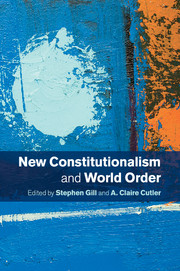Book contents
- Frontmatter
- Contents
- List of Figures
- List of Contributors
- Acknowledgements
- List of Acronyms
- 1 New constitutionalism and world order
- Part I Concepts
- Part II Genealogy, origins and world order
- Part III Multilevel governance and neo-liberalization
- 7 When the global inhabits the national
- 8 New constitutionalism and variegated neo-liberalization
- 9 New constitutionalism and multilevel governance
- Part IV Trade, investment and taxation
- Part V Social reproduction, welfare and ecology
- Part VI Globalization from below and prospects for a just new constitutionalism
- Glossary
- Appendix
- Bibliography
- Index
9 - New constitutionalism and multilevel governance
from Part III - Multilevel governance and neo-liberalization
Published online by Cambridge University Press: 05 February 2014
- Frontmatter
- Contents
- List of Figures
- List of Contributors
- Acknowledgements
- List of Acronyms
- 1 New constitutionalism and world order
- Part I Concepts
- Part II Genealogy, origins and world order
- Part III Multilevel governance and neo-liberalization
- 7 When the global inhabits the national
- 8 New constitutionalism and variegated neo-liberalization
- 9 New constitutionalism and multilevel governance
- Part IV Trade, investment and taxation
- Part V Social reproduction, welfare and ecology
- Part VI Globalization from below and prospects for a just new constitutionalism
- Glossary
- Appendix
- Bibliography
- Index
Summary
Introduction
Stephen Gill has argued that a key component of the contemporary neo-liberal project is the growing use of legal-juridical mechanisms designed to separate economics from politics in order to ‘lock in’ neo liberal policies over the long term. The intent of this process, which he terms the ‘new constitutionalism’, is to insulate economic policies from democratic influence in a way that privileges mobile investors and firms (1995a, 1998b). Moreover, by drawing on the work of neo-liberal intellectuals such as Friedrich von Hayek, Milton Friedman and James Buchanan, Gill has demonstrated that the concept of new constitutionalism is a valuable tool for theorizing a central and self-conscious element of the contemporary neo-liberal project. However, one aspect of new constitutionalism that is under-explored in Gill’s work is the neo-liberal approach to federalism, known as ‘market-preserving federalism’, and its more recent application to the regional and global levels.
Reflecting this gap, this chapter examines the neo-liberal approach to multilevel governance. In doing so, it makes three arguments. The first is that neo-liberalism contains an explicit and self-conscious normative project for multilevel governance, which is fully consistent across the federal, regional and global levels. The second argument made is that the neo-liberal project for multilevel governance can be understood as a distinct subset of new constitutionalist initiatives in so far as it seeks, through legal-juridical mechanisms and intergovernmental bargaining, to separate the economic and the political across a uniquely vertical axis. The third argument is that the neo-liberal project for multilevel governance is being actively promoted by neo-liberal social forces, and opposed by progressive social forces, and can thus provide a model for explaining the policies they advocate on a wide variety of issues related to federal, regional and global governance.
- Type
- Chapter
- Information
- New Constitutionalism and World Order , pp. 143 - 158Publisher: Cambridge University PressPrint publication year: 2014
- 8
- Cited by

